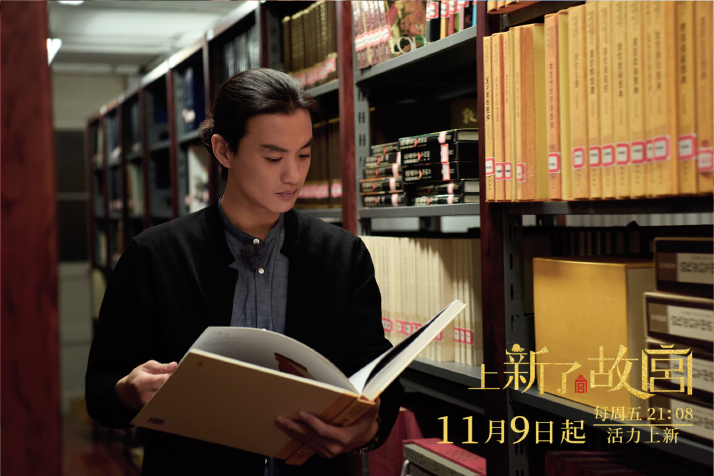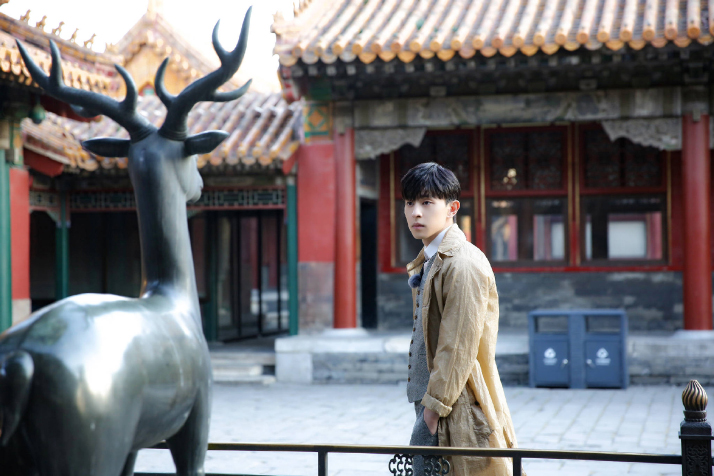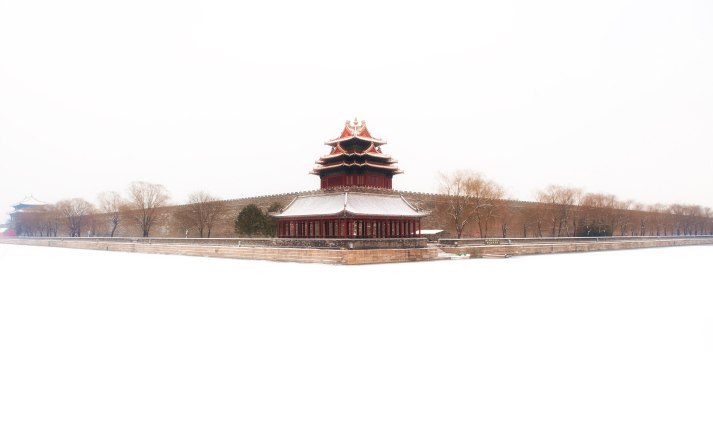| Lifestyle |
| Mysteries Unveiled | |
| A new show offers glimpses into the Forbidden City's secrets | |
|
|
 A poster of Shang Xin Le Gu Gong with Zhou Yiwei (FILE)
A cultural variety show titled Shang Xin Le Gu Gong is taking China by storm. Translated as There Is Something New in the Forbidden City, the unique broadcast has been going on air every Friday night since November 9 on Beijing TV and video streaming on iQiyi.com. This is not the first time that the Forbidden City, or Palace Museum, China's royal residence during the Ming (1368-1644) and Qing (1644-1911) dynasties, has appeared in a TV program. Previous endeavors sought to introduce the historical site to audiences through documentaries such as Masters in the Forbidden City, which followed cultural relic repairers at the Palace Museum and was first broadcast on China Central Television in 2016. However, the new show is being acclaimed for its light-hearted way of bringing the museum closer to ordinary people. Produced by the Palace Museum itself and Beijing TV, it is co-produced by the Hwachain Cultural Company. Zhu Yong, Director of the Film and Television Department at the Institute of Gugong Studies, a research institute affiliated to the Palace Museum, is the chief screenwriter for the show. He said the show hopes to present the museum's cultural treasures accumulated over nearly 600 years to young audiences in a vibrant and fashionable way.  A still from Shang Xin Le Gu Gong with Deng Lun (FILE)
Lively presentation Each episode starts with Shan Jixiang, President of the Palace Museum, assigning a mission to two actors, Deng Lun and Zhou Yiwei. They then consult experts from the Palace Museum and historical documents to find clues to execute the mission. The Palace Museum has real cats that have become icons and have featured in many cultural and creative products. A virtual cat is the audience's instructor throughout the show. A head shot of the cat pops up at the bottom of the screen whenever it is necessary to disseminate information related to the museum. The cat's voice is lent by the actor who did the voice for Lu Ban in Glory of the King, an online game produced by China's Internet giant Tencent. In the first episode, Shan asks the two actors to look for the "secret garden" belonging to Qing Dynasty Emperor Qianlong (1711-99). They are later joined by Hong Kong actress Ada Choi who played the empress in the 2011 Qing Dynasty costume TV drama The Legend of Zhenhuan. The three set out to look for the garden and finally find it in the Ningshougong (Hall of Peaceful Longevity) Garden in the northeastern section of the Palace Museum, an area closed to the public. Juanqinzhai (Studio of Exhaustion After Diligent Service) in the northernmost part of the garden is the most lavish structure within the Ningshougong Garden. Qianlong built it as his residence after abdicating. However, since Qianlong never really let go of power even after abdication, he never actually lived in the garden but only watched plays and other forms of entertainment there. The architecture shows the emperor's fascination with the land immediately south of the lower reaches of the Yangtze River, known as Jiangnan. Bamboo-shaped wood carvings and double-side embroidery all demonstrate his love for Jiangnan, which he visited six times during his lifetime. Several short plays are presented in Juanqinzhai in the middle of the show with Zhou playing Qianlong in dialogue with himself, showing his inner struggle between being emperor and his pursuit of freedom. At the end of the show, a cultural and creative product designer creates a cosmetics set consisting of a lipstick, an eyebrow pencil and a box of powder decorated with images of bamboo and birds in Juanqinzhai. They are all in green resembling jade. The cosmetics set is then put on sale on e-commerce platforms for around 1,000 yuan ($145). In later episodes, the two actors are joined by different actresses, including Ning Jing who played Empress Dowager Xiaozhuang (1613-88), concubine of the second emperor of the Qing Dynasty Huangtaiji, in a TV drama in 2002.  The snow-covered turret of the Palace Museum
Preserving culture In order to avoid the huge crowds at the Palace Museum, the crew had to be outside the museum around 6 a.m. so as to start shooting immediately after the museum opened at 8 a.m. In 2017, the Palace Museum attracted over 16 million visitors, an increase of 4.25 percent year on year. In addition, due to restrictions on time allowed for shooting in consideration of cultural heritage protection, some scenes in closed areas had to be shot in front of green screens. The show, with three seasons of 10 episodes each, is a tribute to the 600th anniversary of the Forbidden City and the 95th anniversary of the Palace Museum. Its last season will be in 2020. "It's a fantastic program. It enables me to learn a lot about the Palace Museum," one viewer commented on the bullet screen, an emerging new feature on online video sites in China which allows real-time comments from viewers to fly across the screen like bullets. Liu Bing, CEO of Hwachain, said traditional culture needs to be promoted because it has not saturated people's lives yet. The Palace Museum was chosen as the entry point for creating cultural and creative products not only because it is the largest and most complete ancient architectural cluster in China, but more importantly because of its role as emperors' living space during the Ming and Qing dynasties for nearly 600 years. Recently, the museum has made multiple efforts to draw more young people to traditional culture, including launching accounts on social media platforms. It has also engaged in developing cultural and creative products and launched a flagship store on Tmall.com, with the sales volume of its cultural and creative products reaching 1 billion yuan ($145 million) in 2017. "The effective way to preserve traditional culture is to spread it to ordinary households in the form of useful cultural products," said Liu. Copyedited by Rebeca Toledo Comments to jijing@bjreview.com |
|
||||||||||||||||||||||||||||
|